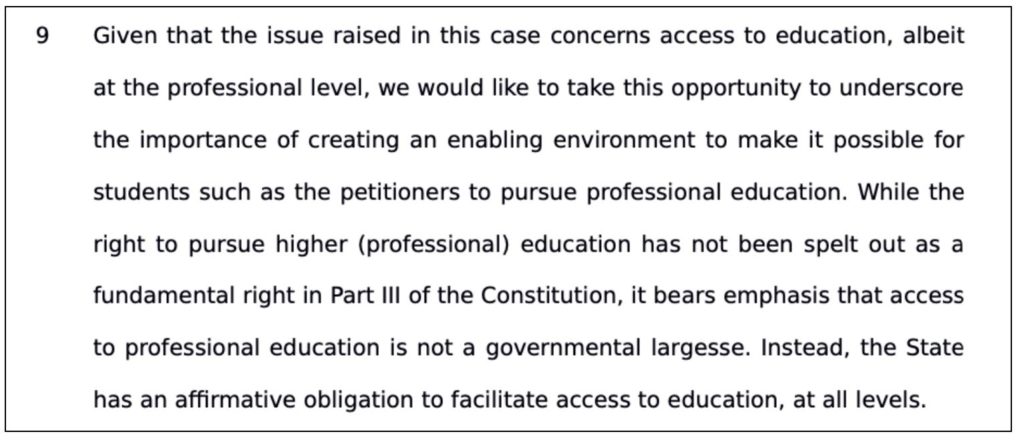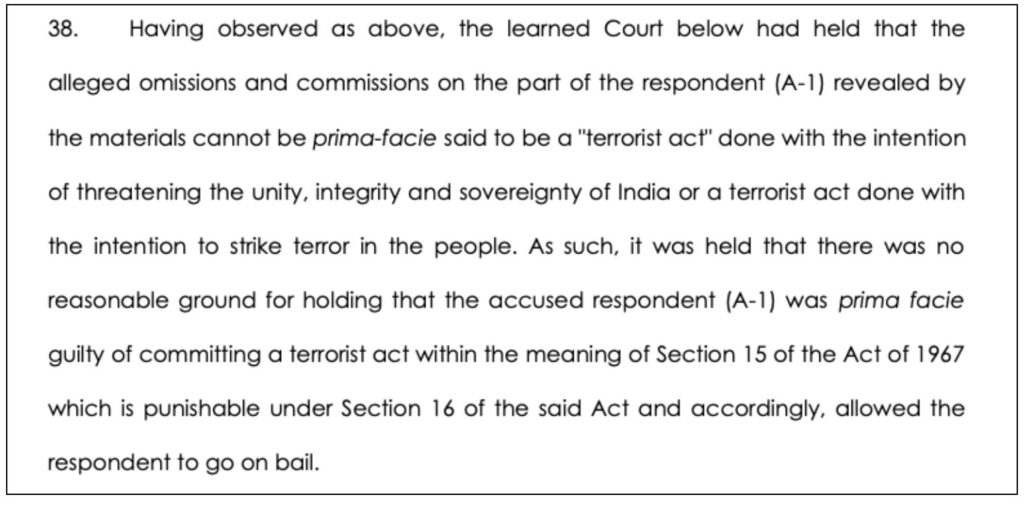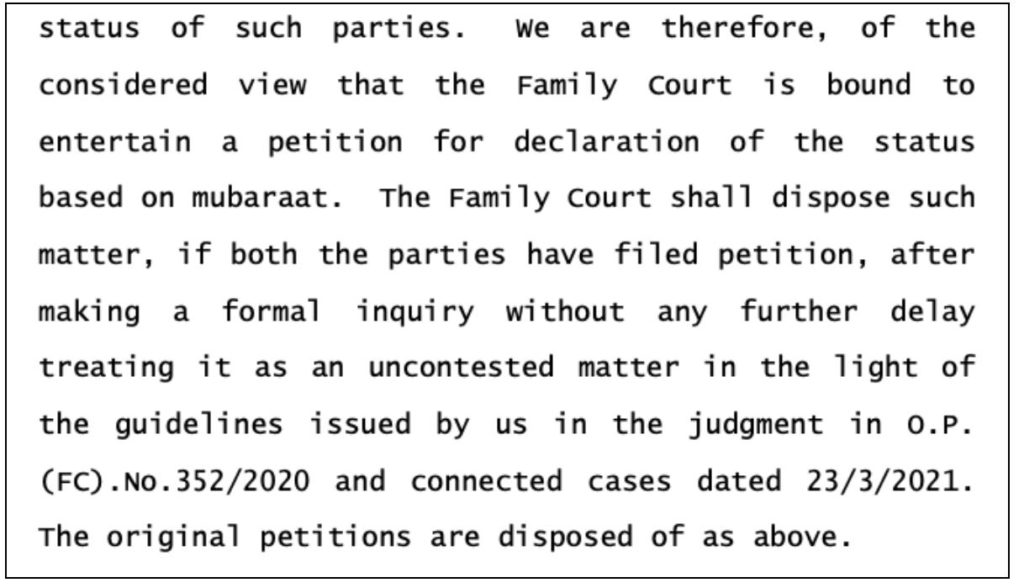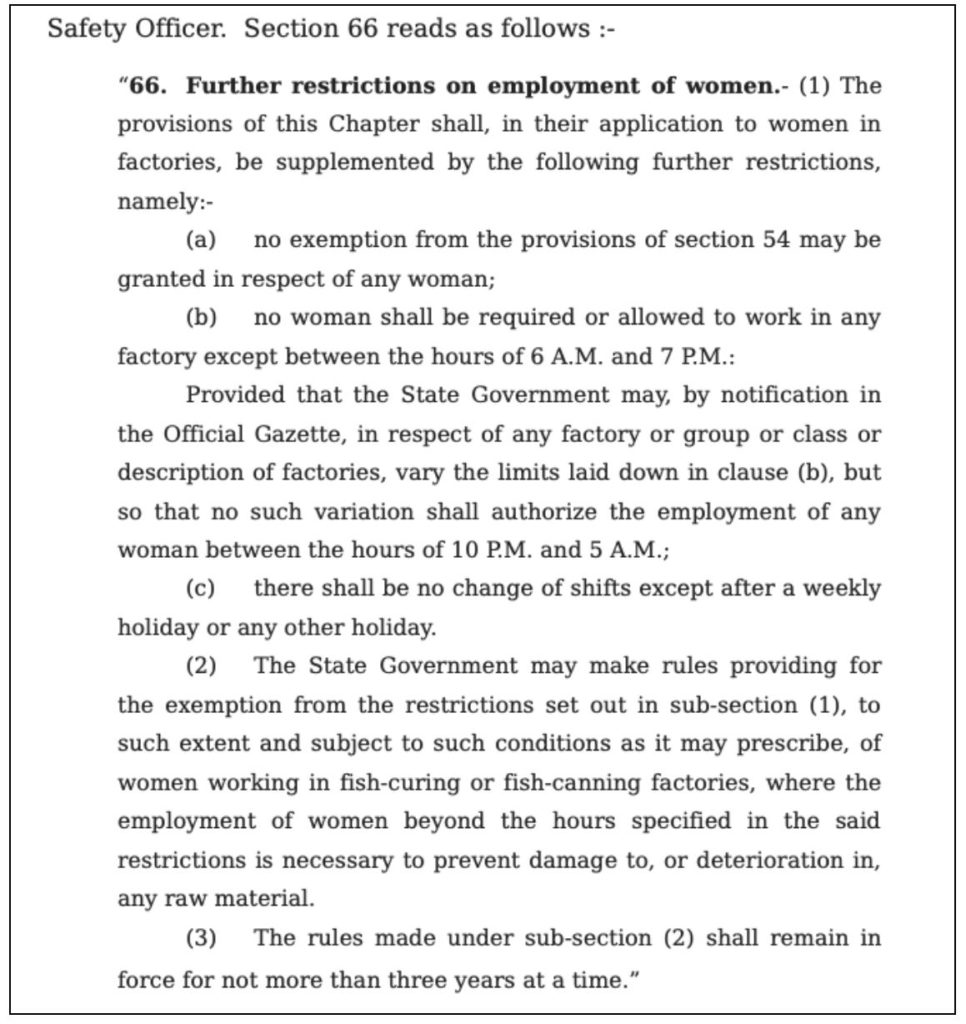In this roundup of important court judgments, we look at constitutional court remarks & directions regarding the State’s obligation to enable access to higher education, the nature of crimes under UAPA, the validity of extrajudicial modes of divorce for Muslim women, and employment discrimination.
Supreme Court: State has an affirmative obligation to facilitate access to education, at all levels.
In the case of Farzana Batool vs. Union of India and others, the apex court held that the State has an affirmative obligation to facilitate access to education, at all levels.
The court was hearing a plea filed by two students from Ladakh who were nominated by the Administration of Ladakh for admission into the MBBS degree course under the ‘central pool’ seats. One of them has been allocated against a seat at Lady Hardinge Medical College (LHMC) and the other has been assigned to Maulana Azad Medical College (MAMC). These students have not yet been admitted to their course of studies despite due nomination by the Administration of the Union Territory of Ladakh.
In view of the above, the court directed that the admission formalities for both the petitioner be completed immediately and, in any event, within a week from the date of the judgment. The case was represented primarily as procedural difficulty in accessing higher education. However, the court used this opportunity to underscore the obligation of government to enable the right to pursue higher education with respect to Part III of the Constitution.

In lieu of this petition, the court issued general directions in order to obviate the possibility of similarly placed students. The court held that financial hardship should not prevent the students from getting admission in terms of the allocation which has been made in their favour legitimately under the central pool seats.
The judgement notes that this right is of greater importance for students whose background (by virtue of such characteristics as caste, class, gender, religion, disability, and geographical region) imposes formidable obstacles on their path to accessing quality education. The judgement highlights the findings of the Committee on Economic, Social and Cultural Rights (ICESCR). The ICESCR was formed to monitor the implementation of the International Covenant on Economic, Social and Cultural Rights which was ratified by India in 1979. The Committee pertinently notes that disparities in policies that result in differing qualities of education for persons residing in different geographic locations may constitute discrimination under the Covenant. Each state party is required to fulfill the right to education, by facilitating and providing for its realization. Pursuant to these obligations which India has undertaken by being a signatory to the Covenant, the court directed the state governments to ensure proper coordination so that students allocated colleges under the central pool seats are not put to hardship in enrolling once they have been duly allocated their seats. Specifically, the court directed that the Union Government can consider appointing a nodal officer tasked with the responsibility of ensuring that students who are duly nominated under the central pool seats are in fact admitted in their chosen course of study. The court recommended that the details of such officers can be widely publicized on the websites of the central & state authorities. Such an institutional framework, the court believes will ensure that students are not left in the lurch due to lack of help in securing their legitimate admission to the appropriate course. In this way, the court concluded, it will help remedy the broader problem of which the present case is a symptom.
Gauhati HC: Mere Civil Disturbance will not be UAPA Offence unless committed with intention to commit ‘Terrorist Act’
In case State v. Akhil Gogoi, the high court held that merely causing civil disturbances, without the element of intention to cause ‘terrorist act’ would not fall within the ambit of unlawful activity under section 2(1)(o) of the Unlawful Activities Prevention Act (UAPA Act).
The petition was filed by the National Investigation Agency (NIA) against the judgment and order of October 2020 passed by Special Court, NIA, Assam allowing the respondent (Akhil Gogoi) to go on bail after submission of charge-sheet by the Investigating Agency.
It was alleged that Akhil Gogoi had led a crowd of 6000 persons and caused economic blockade and pelting of stones. In the FIR, it has also been alleged that the mob led by the respondent had tried to murder police personnel on duty. While the matter was under investigation by the State Police, by the order of December 2019 of the Ministry of Home Affairs, investigation of this case was entrusted to the NIA. The NIA court had allowed the respondent to go on bail on furnishing a bond of Rs. 30,000 with one surety of the same amount to the satisfaction of the Court.
Upon examining submissions from both sides, the high court contended that the basic allegation against the respondent (Akhil Gogoi) is that of making provocative speeches inciting the public to resort to violence. The judgement notes that it may be true that the violence resorted by the members of the mob was the direct fall out of the speech delivered by the respondent. However, what would be of utmost significance, in this case, is to consider whether the accused/ respondent had delivered such provocative speeches with the intent to commit a “terrorist act” within the meaning of section 15(1)(a) of the Act of 1967, thereby challenging the unity, integrity, security, and sovereignty of India. To that end, the investigation is still underway.

The high court held that the order was passed after taking into consideration of the peculiar facts and circumstances of Akhil Gogoi’s case. It is settled principle in law that the power of the Court to grant bail is discretionary in nature. The high court was conscious of the fact that the trial is yet to commence in this case. Therefore, upon examining the arguments from both sides, the high court concluded that there is no good ground to interfere with the judgment and order passed by the Special Court, NIA to allow bail for Akhil Gogoi.
Kerala HC: Issued directions to Family Courts on the course to follow while adjudicating cases that involved extra judicial modes of divorce for Muslim women.
While upholding the validity of the extrajudicial modes of divorce for women, the Kerala High Court issued directions to Family Courts on the course to follow while adjudicating cases that involved these methods.
The court was examining the question of whether Muslim women have lost their right to invoke extra-judicial divorce, after the coming into force of the Dissolution of Muslim Marriages Act 1939.
The Court directed that in the matter of extra-judicial modes of divorce i.e. talaq, khula, mubaraat, talaq-e-tafwiz, the Family Courts have to entertain such applications moved by either or both parties to declare the marital status of such parties.
- In cases of unilateral modes of dissolution such as khula and talaq, the Court stated that the scope of inquiry before the Family Courts would be limited. In such proceedings, the High Court insisted that the Family Court record the khula or talaq to declare the marital status of the parties after due notice to other parties.
- In case of consensual modes of dissolution such as through the invocation mubaraat and talaq-e-tafwiz, the High Court mandated that on being satisfied that the dissolution is being effected on mutual consent, the Family Court without further inquiry shall declare the marital status.

The Bench specially instructed Family Courts not to adjudicate upon extra-judicial divorce unless it was called upon to do so in an appropriate manner. The Family Court shall endeavour to dispose the cases treating it as uncontested matter, without any delay by passing a formal order declaring the marital status
Kerala HC: Women Can’t Be Denied Employment Saying Work Involves Night Hours
In the case Treasa Josfine vs State of Kerala and others, the high court held that a woman who is fully qualified cannot be denied of her right to be considered for employment only on the basis of her gender.
The court was hearing an appeal against a job notification issued by Kerala Minerals and Metals Limited which allowed only male candidates to apply for the post. The petitioner worked as a Graduate Engineer Trainee (Safety) at Kerala Minerals and Metals Limited for a few months between 2018 and 2020. A permanent post of Safety Officer became available in the company and a notification was published inviting applications for the said post. However, it is stated in the notification that only male candidates need to apply for the post.
The company i.e. Kerala Minerals and Metals Limited submitted that the post of Safety Officer is a statutory post and the provisions of the Factories Act have to be complied with. It is submitted by the organization that as per Section 66(1)(b) of the Factories Act, 1948, women employees shall not be required or permitted to work except between 6 am and 7 pm. Safety Officer is a round-the-clock post and that the person engaged as Safety Officer will have to work even during the night time if required. Since women cannot be engaged in factories beyond 7 pm, permission cannot be accorded for considering women for the appointment.

The state government submitted that the Labour Department has formulated a draft ordinance for amendment of the Factories Act, 1948 enabling women employees to work night shifts, which was approved by the Council of Ministers in August 2020 and the Labour Department has issued a letter to the Secretary, Ministry of Home, Government of India for approval of the President. The amendment has not been brought into effect and therefore, going by the present situation, the restriction for women to be engaged in factories after 7 pm. and before 6 am continues to be in force.
After considering all submissions, the high court held that Section 66(1)(b), which is a protective provision, cannot be relied on to deny appointment to the petitioners only on the ground that they are women. The court also observed that the company could have moved the Government for a permission as provided in Section 66(1)(b), which was not done. Therefore, the denial of employment to the petitioners on the ground that they would have to work night shifts was not sustainable.
The judgement acknowledges that the basic contention of Section 66(1)(b) is beneficial in nature and is intended to protect women from exploitation. However, one has to consider the fact that the Factories Act, 1948 was enacted at a time when requiring a woman to work in an establishment of any nature, more so in a factory, during the night time could only be seen as exploitative and violative of her rights. Women are now being engaged to work during all hours in several industries including Health Care, Aviation and Information Technology. The judgement emphasises that women have been engaged in several professions requiring round the clock labour and have proved themselves quite capable of facing the challenges of such engagement.
In conclusion, the court held that a woman who is fully qualified cannot be denied her right to be considered for employment only on the basis of her gender. The court ordered that it is the bounden duty of the respondents who are Government and Government functionaries to take all appropriate steps to see that a woman is able to carry out the duties assigned to her at all hours, safely and conveniently.
Featured Image: Important Court Judgements


